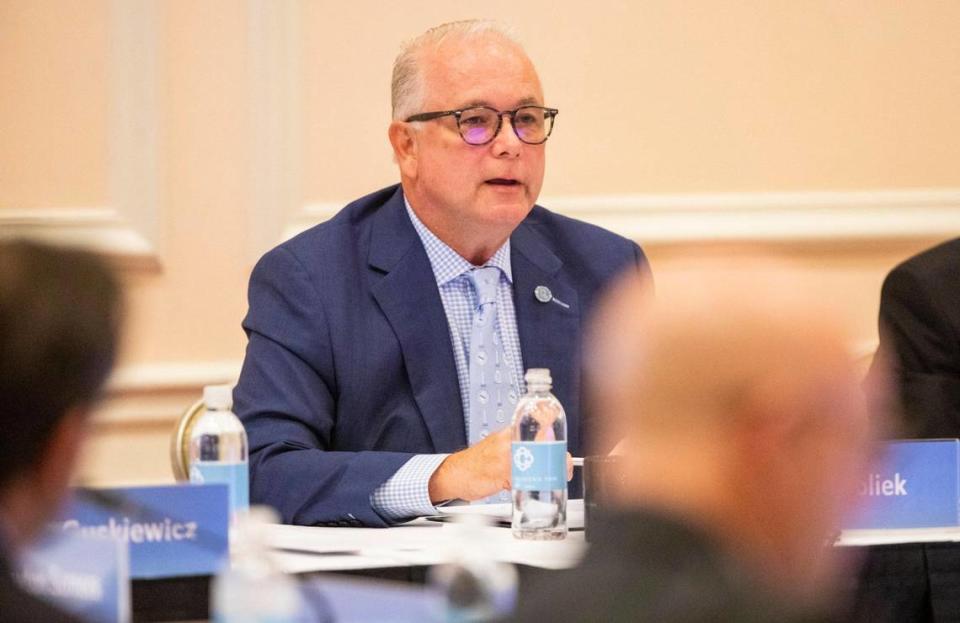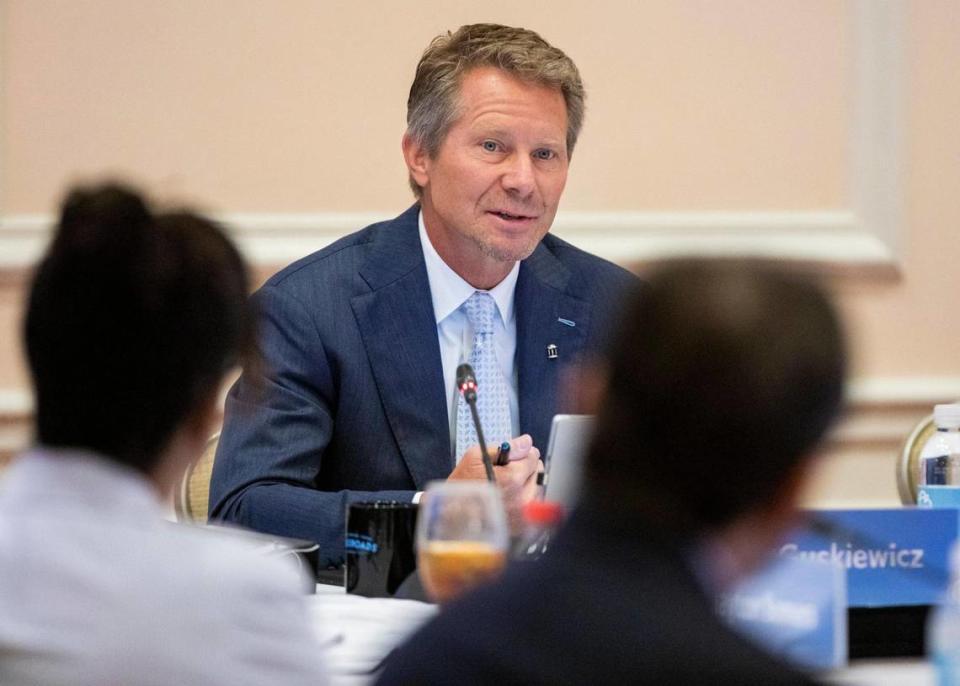Who should have power in UNC-CH decisions — campus trustees, leaders or the BOG?
The UNC-Chapel Hill Board of Trustees on Wednesday discussed the powers it has to make campus decisions on issues including personnel actions and tuition. That was prompted by a UNC System Board of Governors’ resolution passed this summer to amend and restate what the boards of trustees at individual campuses do.
The resolution essentially asks campuses to map out where power is delegated and who decides about campus issues, from tenure to tuition.
After the meeting, UNC-CH Board of Trustees Chair Dave Boliek said this assignment will give the board and the university community a clear picture of who is making what decisions.
“This is an opportunity to take a look at where responsibilities lie within the university,” Boliek said. “If you know where the responsibility is, you then know where the accountability is for decision-making.”
That will help make sure campuses are operating within the confines of the law, the budget and the university’s mission, he said.
Boliek said he doesn’t yet know what key issues might be up for debate. But when policies have been in place for decades and “this is the way we’ve always done it” comes into play, things might need to change, he said.

Should campus administration have more authority?
The trustees’ discussion also comes after complaints from UNC-CH faculty and the newly established Coalition for Carolina group regarding decision-making that affects campuses.
UNC-CH faculty chair Mimi Chapman, a founding member of the group, said many of the recent controversies on the Chapel Hill — including Nikole Hannah-Jones’s tenure, the Silent Sam Confederate monument and COVID-19 reopening plans — are rooted in the governance structure of the UNC System. That includes the UNC-CH Board of Trustees and the UNC System Board of Governors.
“There’s a level of interference in campus affairs that just simply complicates decision-making and has taken away autonomy from campuses,” Chapman previously told The News & Observer. “The administration doesn’t have the delegated authority it needs.”
After the meeting Wednesday, UNC-CH Chancellor Kevin Guskiewicz said this is a healthy exercise that will determine who has the authority to make certain decisions.
He said campus leaders often get asked about whether policies and decisions derive from state statutes, the system office, Board of Governors policy or Chapel Hill policy, particularly with personnel decisions. Now, the university should be able to answer questions fairly quickly because they’ll have a table that shows this decision is made by this person or group, he said.

When asked if there are certain authorities the chancellor should have that are currently in the hands of the board, Guskiewicz said there’s “an awful lot” that’s delegated out to the chancellor.
“The bottom line is I believe in shared governance,” Guskiewicz said. “This is an opportunity to show how we actually carry out shared governance.”
There are a number of things that he doesn’t technically need to go to the board or the faculty for approval, but Guskiewicz said he will pick up the phone and get feedback from them.
Directive from Board of Governors
Each university in the system was instructed to review the specific authorities its board of trustees has to make certain decisions and what authorities are delegated to the chancellor or other campus administrators. That includes the authority to make recommendations for tuition and to make personnel decisions like faculty tenure and employee salaries.
Each university must then adopt a proposed resolution detailing those delegated authorities, including any changes. Any authority not delegated expressly by such resolution is vested immediately in the board of trustees of that constituent institution, according to the Board of Governors.
That proposal is expected to be submitted to UNC System President Peter Hans by Oct. 1. Hans will then review and approve the proposal, and return it to the campus boards of trustees for final adoption before Nov. 1.
At the meeting when the resolution passed, board members explained how every system school has different policies, according to Guskiewicz. This exercise will help determine where policies can be uniform and where certain schools should be given different authorities based on their mission.
What are the UNC-CH trustees’ current authorities?
The powers and duties granted to the UNC-CH Board of Trustees now include:
Authority to receive reports or presentations from campus officials. Such reports may be related to campus operations, audits, diversity and inclusion, athletics, budget, etc.
Authority to review personnel or disciplinary matters through university proceedings, including terminating employment and student conduct cases.
Policy-making authority related to academic tenure, undergraduate admissions, separation policies for administrators, patent procedures and others.
Authority to approve certain actions or items such as personnel, finance, academic affairs, student affairs and naming.
Authority to establish or maintain a fund, committee, or related entity.
Authority to advise the chancellor and the BOG about campus operations and ensure compliance with the university’s mission.
Authority to make recommendations to the UNC System Board of Governors or president about chancellor searches, tuition and fees.
The full presentation detailing the UNC-CH Board of Trustees authorities can be viewed online.
Boliek said he plans to call a special meeting in the first week of October to actually vote on potential changes.

 Yahoo Movies
Yahoo Movies 